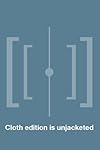Ernest Nagel (1901–1985)
Autor de El teorema de Gödel
Sobre El Autor
Born in Czechoslovakia, Ernest Nagel emigrated to the United States and became a naturalized American citizen. In 1923 he graduated from the City College of New York, where he had studied under Morris Cohen, with whom he later collaborated to coauthor the highly successful textbook, An Introduction mostrar más to Logic and Scientific Method (1934). Pursuing graduate studies at Columbia University, he received his Ph.D. in 1930. After a year of teaching at the City College of New York, he joined the faculty of Columbia University, where in 1955 he was named John Dewey Professor of Philosophy. In 1966 he joined the faculty of Rockefeller University. Nagel was one of the leaders in the movement of logical empiricism, conjoining Viennese positivism with indigenous American naturalism and pragmatism. In 1936 he published in the Journal of Philosophy the article "Impressions and Appraisals of Analytic Philosophy," one of the earliest sympathetic accounts of the works of Ludwig Wittgenstein, Moritz Schlick, and Rudolf Carnap intended for an American audience. Nagel was esteemed for his lucid exposition of the most recondite matters in logic, mathematics, and natural science, published in essays and book reviews for professional journals, scientific periodicals, and literary reviews. Two of his books, now out of print, consisted of collections of his articles, Sovereign Reason and Other Studies in the Philosophy of Science (1954) and Logic Without Metaphysics and Other Essays in the Philosophy of Science (1957). He also wrote a monograph, Principles of the Theory of Probability (1939) which appeared in the International Encyclopedia of Unified Science. In his major book-length work, The Structure of Science, Nagel directed his attention to the logic of scientific explanations. (Bowker Author Biography) mostrar menos
Series
Obras de Ernest Nagel
Logic, Methodology and Philosophy of Science Proceedings of the 1960 International Conference (1962) — Editor — 8 copias
Simbolismo y ciencia 2 copias
Liberalism and Intelligence 1 copia
Obras relacionadas
Etiquetado
Conocimiento común
- Nombre canónico
- Nagel, Ernest
- Nombre legal
- Nagel, Ernest
- Fecha de nacimiento
- 1901-11-16
- Fecha de fallecimiento
- 1985-09-20
- Género
- male
- Nacionalidad
- USA
- Lugar de nacimiento
- Nové Mesto nad Váhom, Regio Trenčín, Koninkrijk Bohemen, Oostenrijk-Hongarije
- Lugar de fallecimiento
- New York, New York, USA
- Lugares de residencia
- Nové Mesto nad Váhom, Regio Trenčín, Koninkrijk Bohemen, Oostenrijk-Hongarije
New York, New York, USA - Educación
- City College of New York (BSc|1923)
Columbia University (PhD|1931) - Ocupaciones
- professor
- Relaciones
- Nagel, Alexander (son)
Nagel, Sidney (son) - Organizaciones
- Columbia University
Rockefeller University - Biografía breve
- Ernest Nagel ging in 1911 naar de Verenigde Staten en werd in 1919 genaturaliseerd tot Amerikaans staatsburger. Hij heeft zijn hele leven in New York gewoond, waar hij als wetenschapsfilosoof werkzaam was aan de Columbia University (1931-1966), de Rockefeller University (1966-1967) en wederom de Columbia University (1967-1970). Hij was een van de vooraanstaande figuren in de filosofische stroming van het logisch positivisme. Hij werd in 1977 gekozen in de National Academy of Sciences.
Nagel is op 20 januari 1935 getrouwd met Edith Alexandria Haggstrom (ovl. 1988). Zij kregen twee zoons: Alexander Joseph (hoogleraar wiskunde aan de Universiteit van Wisconsin-Madison) en Sidney Robert (hoogleraar natuurkunde aan de Universiteit van Chicago).
Miembros
Reseñas
Listas
También Puede Gustarte
Autores relacionados
Estadísticas
- Obras
- 14
- También por
- 9
- Miembros
- 1,900
- Popularidad
- #13,551
- Valoración
- 3.9
- Reseñas
- 19
- ISBNs
- 69
- Idiomas
- 11
- Favorito
- 1












